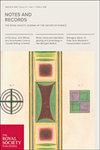对赫胥黎和威尔伯福斯的审查:雅典“明智地软化了”会议的新来源
IF 0.6
3区 哲学
Q3 HISTORY & PHILOSOPHY OF SCIENCE
Notes and Records-The Royal Society Journal of the History of Science
Pub Date : 2017-12-20
DOI:10.1098/rsnr.2016.0058
引用次数: 2
摘要
1860年7月中旬,《雅典报》发表了在牛津举行的英国协会会议上对查尔斯·达尔文理论的讨论摘要。它的叙述省略了牛津主教塞缪尔·威尔伯福斯和科学界的后起之秀托马斯·赫胥黎之间的著名交流。一周后,当地周刊《牛津纪事报》(Oxford Chronicle)发表了一份关于此次会议的更全面的报告,但历史学家对此并不注意。《牛津纪事报》向赫胥黎提供了威尔伯福斯问题的新版,提供了更多关于宗教对人类进化的反对以及权威在大众科学讨论中的适当作用的材料。《雅典纪事》和《牛津纪事》记载的摘录表明,他们可能有一个共同的祖先,其他来源证实了《牛津纪史》中只给出的细节。这一发现表明,雅典的叙事——迄今为止最长、最著名的叙事——被审查,以删除被认为令人反感的材料。《牛津纪事报》为我们提供了一个更全面的故事,讲述了赫胥黎和威尔伯福斯之间的遭遇以及观众的反应。本文章由计算机程序翻译,如有差异,请以英文原文为准。
Censoring Huxley and Wilberforce: A new source for the meeting that the Athenaeum ‘wisely softened down’
In mid July 1860, the Athenaeum published a summary of the discussions about Charles Darwin's theory that took place at the British Association meeting in Oxford. Its account omitted the famous exchange between Samuel Wilberforce, Bishop of Oxford, and Thomas Huxley, the rising man of science. A fuller report of the meeting was published a week later in a local weekly, the Oxford Chronicle, but this has gone unnoticed by historians. The Oxford Chronicle supplies a new version of Wilberforce's question to Huxley, with more material about religious objections to human evolution and the proper role of authority in popular scientific discussions. Excerpts from the Athenaeum and Oxford Chronicle accounts show that they likely had a common ancestor, and other sources corroborate details given only in the Oxford Chronicle. This discovery reveals that the Athenaeum narrative—until now the longest and best known—was censored to remove material that was considered objectionable. The Oxford Chronicle gives us a fuller story of what was said and how the audience reacted to the encounter between Huxley and Wilberforce.
求助全文
通过发布文献求助,成功后即可免费获取论文全文。
去求助
来源期刊
CiteScore
1.50
自引率
0.00%
发文量
45
审稿时长
>12 weeks
期刊介绍:
Notes and Records is an international journal which publishes original research in the history of science, technology and medicine.
In addition to publishing peer-reviewed research articles in all areas of the history of science, technology and medicine, Notes and Records welcomes other forms of contribution including: research notes elucidating recent archival discoveries (in the collections of the Royal Society and elsewhere); news of research projects and online and other resources of interest to historians; essay reviews, on material relating primarily to the history of the Royal Society; and recollections or autobiographical accounts written by Fellows and others recording important moments in science from the recent past.

 求助内容:
求助内容: 应助结果提醒方式:
应助结果提醒方式:


